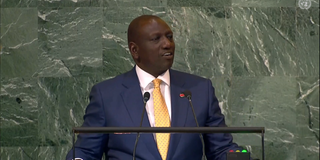Financing: Untapped frontier

President William Ruto makes his speech during the 77th session of the UN General Assembly in New York, US on September 22, 2022. Dr Ruto called for the fulfilment of the Paris Agreement financing pledges.
What you need to know:
- Addressing the UN General Assembly this week, Dr Ruto called for the fulfilment of the Paris Agreement financing pledges.
- Kenya was among the first to ratify and domesticate the deal, which set out Nationally Determined Contributions to cut greenhouse gas emissions by 32 per cent by 2030.
- Climate adaptations and mitigation efforts remain largely underfunded, however, slowing the transition to a sustainable economy.
Kenya is adversely affected by climate change with the northern regions suffering unprecedented levels of droughts and famine, yet the country is highly dependent on climate-volatile sectors like agriculture, tourism and wildlife.
President William Ruto has cited climate change as central to his agenda.
Addressing the UN General Assembly this week, Dr Ruto called for the fulfilment of the Paris Agreement financing pledges.
Coming ahead of COP 27, due in Egypt in November, it highlights the region’s climate vulnerability.
Kenya was among the first to ratify and domesticate the deal, which set out Nationally Determined Contributions to cut greenhouse gas emissions by 32 per cent by 2030.
Climate adaptations and mitigation efforts remain largely underfunded, however, slowing the transition to a sustainable economy.
Climate financing is a huge opportunity that needs to be pursued. The National Climate Change Action Plan (NCCAP), 2018-2022 revised the estimates for adaptation and mitigation actions by 2030 to Sh65 billion.
But climate financing remains the untapped frontier in the fight against climate change effects as it has a huge potential to push the country towards the attainment of the National Determined Contributions by 2030.
Green financing brings on board the financial sector as key players in the interventions.
With policies to compensate for the exposure, Kenya can tap on the strength of the financial sector to direct investments into renewable energy, climate-resilient infrastructure, sustainable agriculture and waste management, among others.
Data show only 40 per cent of climate-related investments could be tracked to the private sector.
The national and county governments’ development plans must, therefore, integrate a proactive climate financing mechanism that will facilitate ease of investments.
Prioritise incentives on taxation and product licensing to catalyse climate-friendly investments to bring on board financial institutions.
Mr Kosgei, a banker and award-winning social entrepreneur, is the founder of One Child One Tree Initiative. [email protected]. @JeffreyKosgei





